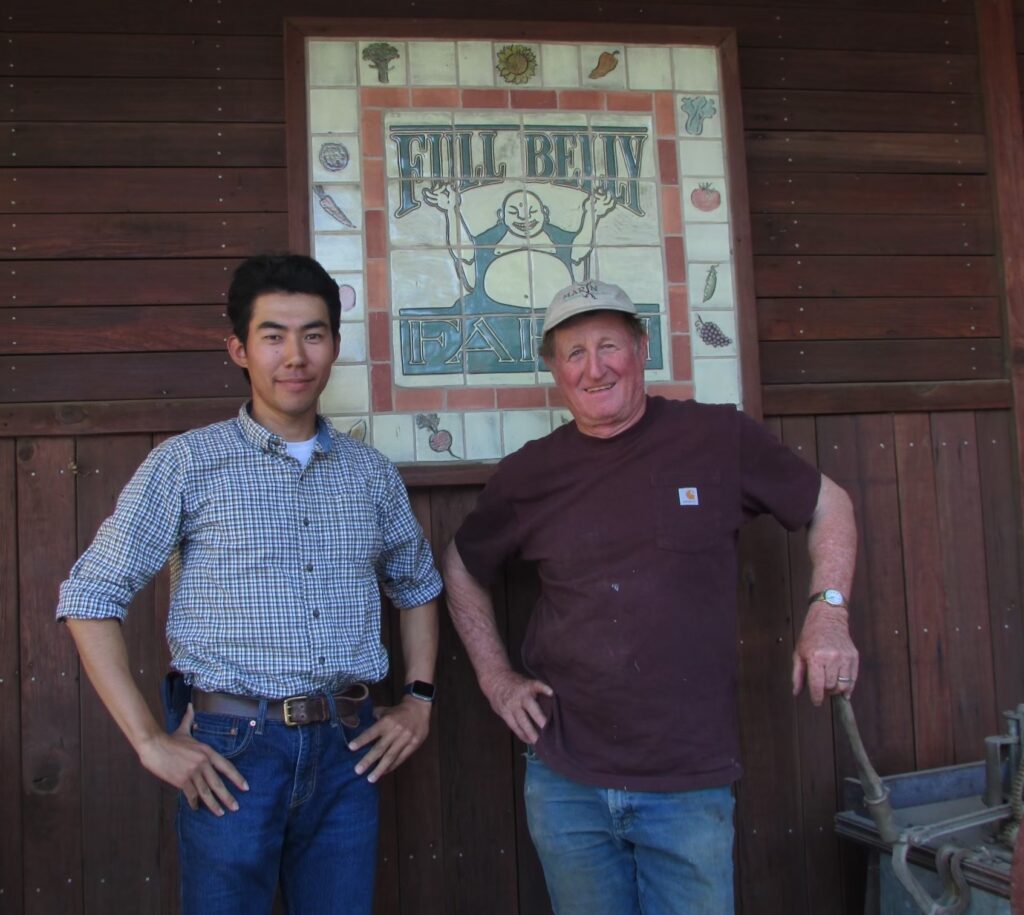
It’s my pleasure to introduce you to one of our interns, Isshin Itaka, who is also a member of the 2022-2023 Japanese Agricultural Training Program cohort. He arrived last August and is a staple of the Saturday Palo Alto farmers market crew, in addition to doing many other tasks around the farm. He takes great photos and videos (and is very tech-savvy), asks excellent questions (about farming, English vocab/pronunciation, and more), and is a hard worker, putting in countless hours after work for his farm back in Japan (more about that below).
I interviewed Isshin on our drive back from the Palo Alto market on Saturday and have a (very slightly) edited version of our conversation below.
– Elaine Swiedler, CSA Manager
Where did you grow up? How and when did you start working in farming?
I was born in Kanagawa but moved to Fukuoka when I was 10. In college I studied technical robotics engineering. I was not planning to do farming. After my third year in college, I was thinking about my future and which company I should work for. Almost everyone needs an engineering technician, which is one of the reasons I wanted to learn engineering. A lot of the other people studying engineering go to work for big companies. I didn’t want to do the same thing; I like to do things differently than other people. My mother’s cousin has a rare vegetable farm in Japan and I choose to work for them. I hadn’t spent much time on farms before then, just a short time after my third year of college. I worked for them for a year before coming here.
What made you apply to the Japanese Agricultural Training Program?
My boss did the program over 20 years ago and recommended it.
Can you describe the farm you were working at? What did you do there?
It is called Kubota Farms in Itoshima, near Fukuoka. It is 17 acres, with greenhouses and outdoor spaces. We have two locations. One is at higher elevation so it is cooler. We grow rare vegetables, microgreens, and herbs and sell them to fancy restaurants and hotels. We are a bit of a strange farm because of what we grow and because we only sell to hotels and fancy restaurants. We have a lot of rare vegetables in Japan and most people don’t know about them. One of the things we grow is rhubarb. Before I started working at the farm I didn’t know what it was!
I was in charge of some herbs and red mizuna, doing cultivation and tractor work. I also ordered seeds and did coding. The coding is for our inventory management programs, and similar things.
*Note: The Kubota Farms website has a lot of photos of what they grow, like on this page, and you can use Google Translate or another service to translate the text. You can read a bit more about the farm and some of the restaurants it sells to here, here, and here.
You’re still doing work for Kubota Farms while you’re here, right?
Yes, I am still doing seed orders and coding. I just created a new labeling system that prints out better labels, similar to the labels we use at Full Belly for orders.
What is your plan when you go back to Japan?
I will go back to Kutbota Farms. Very far in the future, maybe 20 years, I could be the boss!
What are some of the things you enjoy doing at Full Belly Farm?
I like doing tractor work. I’ve done a lot of cultivating this spring. I also like American farming culture. In my opinion, Japanese farming is a job and farmers just see it as work, but American farming is a lifestyle and the farmers enjoy farming and are very passionate.
Has anything surprised you about farming here, or American culture?
So many little common things. Bay Area traffic is so bad, and the DMV tests are so much easier and cheaper here. Getting a California license required one test and $40. In Japan, I had to go to a school and the whole cost was close to $3,000 and I needed a separate license for using a tractor.
I have been surprised by how much easier it is here for organic farming. The weather is drier and hot, which makes it easier. And there is more awareness and acceptance of funny shapes, and even a little dirt. In Japan, the people would not accept many of the things we sell here, so I was surprised when I saw that American customers do.
What experiences or skills or changes do you plan to bring back with you when you go back?
I want to grow honeynut squash! We don’t have it.

